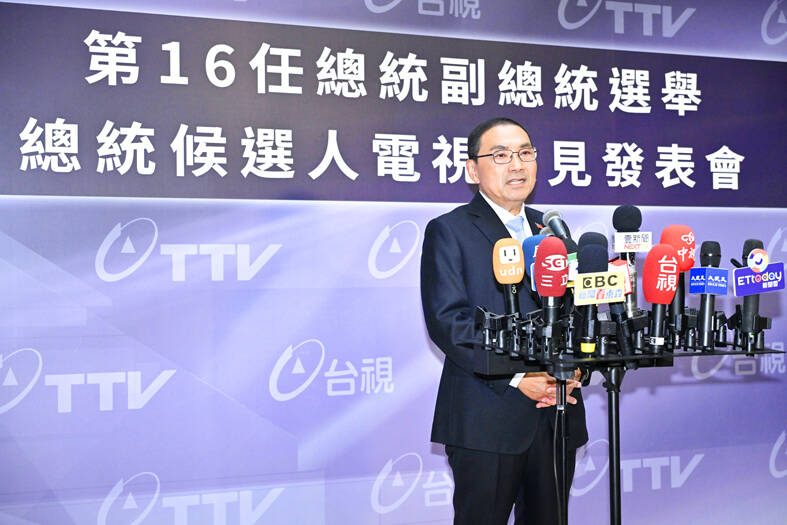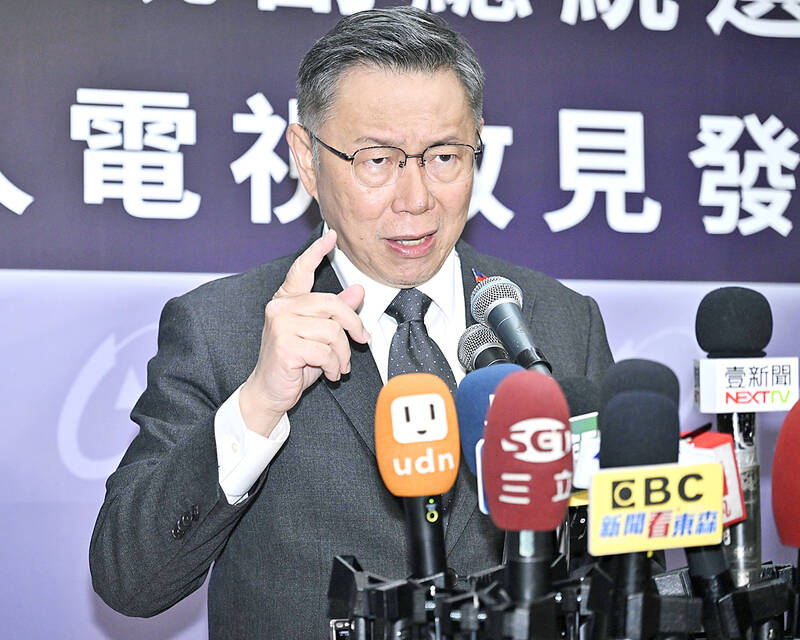Visions regarding the nation’s future and how to sustain economic growth were key issues at the three candidates’ final presidential platform presentations in Taipei yesterday.
The Democratic Progressive Party’s (DPP) presidential candidate, Vice President William Lai (賴清德), said that Taiwan has success in exporting high-tech products throughout the world.
Under the DPP, Taiwan has made friends with many countries, while safeguarding its democracy, freedom and national sovereignty, he said.

Photo: Tu Chien-jung, Taipei Times
“My policy is to boost our trade with the world so that Taiwan has a strong presence in the international community,” Lai said, adding that he is the only candidate voters can trust to continue economic growth, as the other two are advocating over-reliance on China.
Lai said that the other two candidates have spoken on the importance of peace in the Taiwan Strait and interacting with China, including restarting the cross-strait services and trade agreement, but “we must not go back to the old road of depending on China for economic growth.”
“Taiwan has the confidence to do business with many countries worldwide, and share our technology and products, while also safeguarding the nation’s sovereignty,” he said.

Photo: Tu Chien-jung, Taipei Times
Lai also said that Taiwan should open up its financial sector and welcome international investment to become Asia’s leading center for fintech, which includes banking services, information security and business management.
New Taipei City Mayor Hou You-yi (侯友宜), the Chinese Nationalist Party’s (KMT) presidential candidate, said that he and his party are following the Constitution and taking the middle road, as he castigated the other candidates for labeling the KMT as “pro-China.”
“Our party is not pushing for unification with China. If we are elected, we will certainly uphold Taiwan’s democracy and freedom,” Hou said.

Photo: Tu Chien-jung, Taipei Times
He also said that the KMT is against Taiwanese independence, but Taiwan’s future shall be decided by its 23 million citizens.
Taiwan People’s Party Chairman and presidential candidate Ko Wen-je (柯文哲) said the KMT and the DPP both could cause a conflict in cross-strait relations.
Taiwan should make friends with China, Ko said, adding that summits he organized with the Shanghai government when he was Taipei mayor was proof that he is capable of building relationships with Chinese leaders to negotiate cross-strait peace.
Taiwan should follow a “pragmatic diplomacy” to maintain its allies, but it must not return to the “dollar diplomacy of past KMT and DPP governments,” he added.
He is the only clean politician among the three candidates who is not tainted by corruption and “big money politics,” Ko said.
Ko also commented on a recent case in which a ninth grader stabbed a classmate to death, saying that there needs to be a more complete social safety net to protect young people, as well as better healthcare services.
Hou expressed sympathy over the incident and decried "deteriorating" conditions in schools, saying that strong law enforcement and punishments are needed to have a deterrent effect.
"As someone who started out as a low-level police officer, the things I hate the most are drugs, gangsters and illegal firearms," Hou said, calling for the age of prosecution to be lowered from 16 to 14.
Hou also urged for more checks against carrying weapons into school, saying that Taiwan should follow other countries in allowing police and school officials to search students and their personal effects to stop drugs, weapons and other illegal items from entering campus.
However, when carrying out a search, the whole process must be filmed and the parents must be present as witnesses, he added.
All three candidates talked about Taiwan’s healthcare, agreeing to raise wages for all healthcare workers, improve their workplace conditions, shorten their working hours and ensure government support to keep the National Health Insurance from insolvency.

SECURITY: As China is ‘reshaping’ Hong Kong’s population, Taiwan must raise the eligibility threshold for applications from Hong Kongers, Chiu Chui-cheng said When Hong Kong and Macau citizens apply for residency in Taiwan, it would be under a new category that includes a “national security observation period,” Mainland Affairs Council (MAC) Minister Chiu Chui-cheng (邱垂正) said yesterday. President William Lai (賴清德) on March 13 announced 17 strategies to counter China’s aggression toward Taiwan, including incorporating national security considerations into the review process for residency applications from Hong Kong and Macau citizens. The situation in Hong Kong is constantly changing, Chiu said to media yesterday on the sidelines of the Taipei Technology Run hosted by the Taipei Neihu Technology Park Development Association. With

CARROT AND STICK: While unrelenting in its military threats, China attracted nearly 40,000 Taiwanese to over 400 business events last year Nearly 40,000 Taiwanese last year joined industry events in China, such as conferences and trade fairs, supported by the Chinese government, a study showed yesterday, as Beijing ramps up a charm offensive toward Taipei alongside military pressure. China has long taken a carrot-and-stick approach to Taiwan, threatening it with the prospect of military action while reaching out to those it believes are amenable to Beijing’s point of view. Taiwanese security officials are wary of what they see as Beijing’s influence campaigns to sway public opinion after Taipei and Beijing gradually resumed travel links halted by the COVID-19 pandemic, but the scale of

A US Marine Corps regiment equipped with Naval Strike Missiles (NSM) is set to participate in the upcoming Balikatan 25 exercise in the Luzon Strait, marking the system’s first-ever deployment in the Philippines. US and Philippine officials have separately confirmed that the Navy Marine Expeditionary Ship Interdiction System (NMESIS) — the mobile launch platform for the Naval Strike Missile — would take part in the joint exercise. The missiles are being deployed to “a strategic first island chain chokepoint” in the waters between Taiwan proper and the Philippines, US-based Naval News reported. “The Luzon Strait and Bashi Channel represent a critical access

Pope Francis is be laid to rest on Saturday after lying in state for three days in St Peter’s Basilica, where the faithful are expected to flock to pay their respects to history’s first Latin American pontiff. The cardinals met yesterday in the Vatican’s synod hall to chart the next steps before a conclave begins to choose Francis’ successor, as condolences poured in from around the world. According to current norms, the conclave must begin between May 5 and 10. The cardinals set the funeral for Saturday at 10am in St Peter’s Square, to be celebrated by the dean of the College